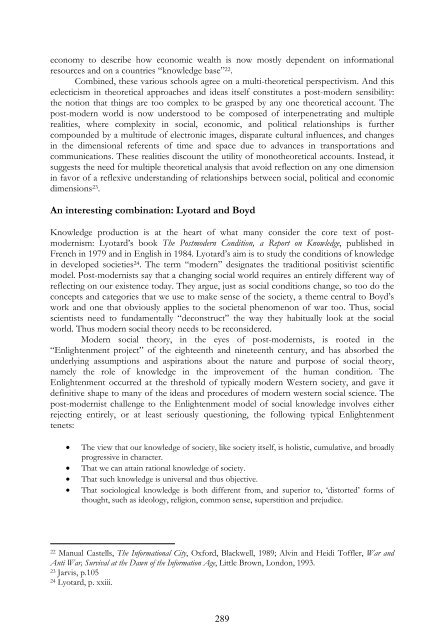Science, Strategy and War The Strategic Theory of ... - Boekje Pienter
Science, Strategy and War The Strategic Theory of ... - Boekje Pienter
Science, Strategy and War The Strategic Theory of ... - Boekje Pienter
Create successful ePaper yourself
Turn your PDF publications into a flip-book with our unique Google optimized e-Paper software.
economy to describe how economic wealth is now mostly dependent on informationalresources <strong>and</strong> on a countries “knowledge base” 22 .Combined, these various schools agree on a multi-theoretical perspectivism. And thiseclecticism in theoretical approaches <strong>and</strong> ideas itself constitutes a post-modern sensibility:the notion that things are too complex to be grasped by any one theoretical account. <strong>The</strong>post-modern world is now understood to be composed <strong>of</strong> interpenetrating <strong>and</strong> multiplerealities, where complexity in social, economic, <strong>and</strong> political relationships is furthercompounded by a multitude <strong>of</strong> electronic images, disparate cultural influences, <strong>and</strong> changesin the dimensional referents <strong>of</strong> time <strong>and</strong> space due to advances in transportations <strong>and</strong>communications. <strong>The</strong>se realities discount the utility <strong>of</strong> monotheoretical accounts. Instead, itsuggests the need for multiple theoretical analysis that avoid reflection on any one dimensionin favor <strong>of</strong> a reflexive underst<strong>and</strong>ing <strong>of</strong> relationships between social, political <strong>and</strong> economicdimensions 23 .An interesting combination: Lyotard <strong>and</strong> BoydKnowledge production is at the heart <strong>of</strong> what many consider the core text <strong>of</strong> postmodernism:Lyotard’s book <strong>The</strong> Postmodern Condition, a Report on Knowledge, published inFrench in 1979 <strong>and</strong> in English in 1984. Lyotard’s aim is to study the conditions <strong>of</strong> knowledgein developed societies 24 . <strong>The</strong> term “modern” designates the traditional positivist scientificmodel. Post-modernists say that a changing social world requires an entirely different way <strong>of</strong>reflecting on our existence today. <strong>The</strong>y argue, just as social conditions change, so too do theconcepts <strong>and</strong> categories that we use to make sense <strong>of</strong> the society, a theme central to Boyd’swork <strong>and</strong> one that obviously applies to the societal phenomenon <strong>of</strong> war too. Thus, socialscientists need to fundamentally “deconstruct” the way they habitually look at the socialworld. Thus modern social theory needs to be reconsidered.Modern social theory, in the eyes <strong>of</strong> post-modernists, is rooted in the“Enlightenment project” <strong>of</strong> the eighteenth <strong>and</strong> nineteenth century, <strong>and</strong> has absorbed theunderlying assumptions <strong>and</strong> aspirations about the nature <strong>and</strong> purpose <strong>of</strong> social theory,namely the role <strong>of</strong> knowledge in the improvement <strong>of</strong> the human condition. <strong>The</strong>Enlightenment occurred at the threshold <strong>of</strong> typically modern Western society, <strong>and</strong> gave itdefinitive shape to many <strong>of</strong> the ideas <strong>and</strong> procedures <strong>of</strong> modern western social science. <strong>The</strong>post-modernist challenge to the Enlightenment model <strong>of</strong> social knowledge involves eitherrejecting entirely, or at least seriously questioning, the following typical Enlightenmenttenets:<strong>The</strong> view that our knowledge <strong>of</strong> society, like society itself, is holistic, cumulative, <strong>and</strong> broadlyprogressive in character.That we can attain rational knowledge <strong>of</strong> society.That such knowledge is universal <strong>and</strong> thus objective.That sociological knowledge is both different from, <strong>and</strong> superior to, ‘distorted’ forms <strong>of</strong>thought, such as ideology, religion, common sense, superstition <strong>and</strong> prejudice.22 Manual Castells, <strong>The</strong> Informational City, Oxford, Blackwell, 1989; Alvin <strong>and</strong> Heidi T<strong>of</strong>fler, <strong>War</strong> <strong>and</strong>Anti <strong>War</strong>, Survival at the Dawn <strong>of</strong> the Information Age, Little Brown, London, 1993.23 Jarvis, p.10524 Lyotard, p. xxiii.289
















